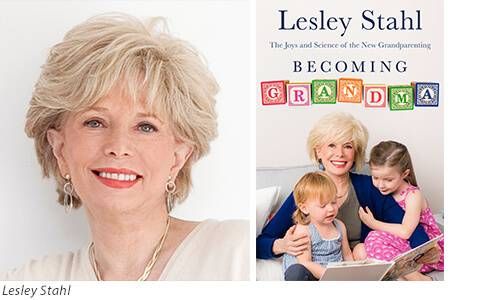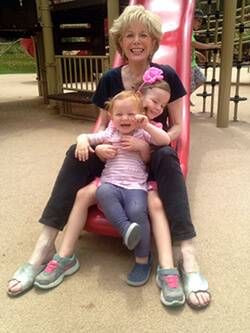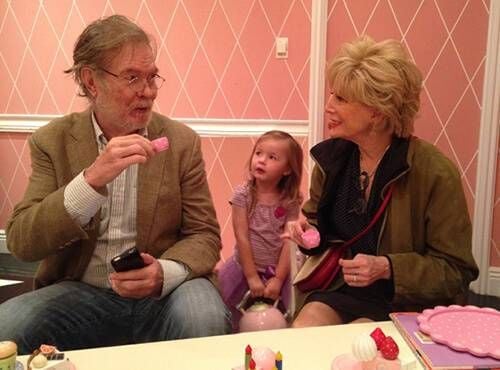Lesley Stahl on Becoming a Modern Grandma
In her new book, the '60 Minutes' reporter digs into being a grandmother
TV reporter Lesley Stahl was a working mom when American society still frowned on women working outside the home. Now the 60 Minutes correspondent is a working grandma, one with the journalistic chops and inclination to investigate and tell stories about life's greatest experiences.
In her new book, Becoming Grandma: The Joys and Science of the New Grandparenting, she uses those skills to explore what it means to be a grandparent today. She puts anecdotes and lessons from her own life — as mom to Taylor and now grandma to Jordan and Chloe — in the context of research from scientists, doctors, anthropologists and psychiatrists.
The following is an excerpt from Chapter 5, Working Grannies:
A New Phase of Grandparenting
In colonial America, life expectancy was short, so there weren’t that many grandmothers. But those women who did survive into old age were like early grandmas: they watched over the toddlers so both parents could work their farms and have more babies.
With the transition to a more urban and industrialized economy in the early 1900s, the elderly came to be seen as more of a burden. But then along came Social Security and Medicare. Together they allowed grandparents to live independently.
We’re now entering another new phase where more and more of us gray-heads are refusing to leave our jobs, just as young adults are delaying getting theirs. It’s as though there’s some biological imperative at work. While our generation left home and launched our careers at 21, today our children are waiting till they’re 31. We’re all postponing growing up or, in our case, growing old. All the passages are lengthening. The Millennials, aged 20 to 35 (our grandchildren), are still living at home — roughly a quarter of them. So many, it’s become acceptable. The dating site Match.com even offers tips on how to conduct a social and sex life under the heading “Dating at Mom and Dad’s House.”

At the same time, by putting off retirement and continuing to earn, we older Americans are extending our independence. This means that many of us are able to send money for our grandchildren’s education, medical bills and day care. As a generation we’re deeply embedded in their lives.
More than half of all American grandmothers are not yet senior citizens. They’re still working age. But as they cross that line, more and more, like me, they’re kicking retirement down the road. So by continuing to work into my 70s, I’m part of a trend. Up to 60 percent of 65-year-olds are putting off retirement, and a third of 68-year-olds. You could say working grandparents are a brood of spring chickens, afraid if they retire they’ll be bored or feel they were benched. Working keeps them feeling young, the boomer Holy Grail. I assume that all the above applies to the septuagenarian rockers who won’t give it up. I’m talking about you, Mick, and you, Keith, still out on tour—in your torn jeans and ponytails—blasting our eardrums. The New York Times said, “The rock ’n’ roll dinosaurs . . . are not going quietly into the pop culture twilight.” Same for all the action-hero sexagenarians like Bruce Willis, Harrison Ford and I’ll-be-back Arnold, still jumping off tall buildings and crushing the bad guys.
Another reason so many grandparents are still on the job is simply because they need the money and health benefits. It used to be that you’d retire, and if you were in good shape, you’d live another 10 years. All your retirement plans were built on that assumption and another one: that if necessary, your grown children would take care of you. But grandparents are realizing they can no longer rely on either. For one thing, they’re going to live a lot longer, most of us for another 20 to 30 years. What was once enough to retire on doesn’t come close anymore.

The other catch is that as a group, grandparents are wealthier than their children. Most 60- and 70-year-olds have more money than 40- and 50-year-olds, which is something we haven’t seen before. So who’s going to take care of whom? The mean household income of boomer grandparents is about $80,000, while their offspring’s is 9 percent lower. We’re spring chickens and rare birds!
Consider this: If you retire at 62, your Social Security benefit will be less than $12,000 a year; wait until you’re 70, and it jumps to $35,000. It almost triples. No wonder so many keep working, especially when they’re spending more than they ever planned to caring for their own aging parents (more and more of whom are living into their 90s) and at the same time helping support their children and grandchildren. According to a Gallup poll, 70 percent of U.S. workers hate their job. But that leaves 30 percent who don’t. That could be because about a third of the baby boomers are college graduates who became professionals and white-collar workers. Unlike their dads, with their mechanical or arduous lift-and-lug jobs, they actually like what they do. Many of them, like me, stay in the game because they don’t want to stop doing what they love.
The hitch to grandparents’ working is that they don’t get to see their grandchildren enough. We’re continuing to contend with the same work-life balance issues we used to, and our daughters do now.
Being a working mother means toggling between both seats of a seesaw, always compensating for the weight of work on one side and the responsibility of a child on the other. It takes constant managing, straddling, offsetting. As a working grandmother you have to deal with the same search for the balance-of-life sweet spot you did as a mother. If you live across the country, that means becoming a magician. You have to either be in two places as the same time or turn them into one place, which is what I did by urging my team at 60 Minutes to find as many stories for me as possible in Southern California.

California was so rich with stories, I practically shuttled to LA in Jordan's first two years of life. On one of my trips to California, as I was racing to be with Jordan, I thought about what it means to grow up. I decided it means that you watch time flow backward. First, when you raise your children, you relive your own childhood, going through (sometimes painfully) the various stages all over again. Then, as a grandparent, you relive your children’s lives. The process tends to soften the indignities of aging.

